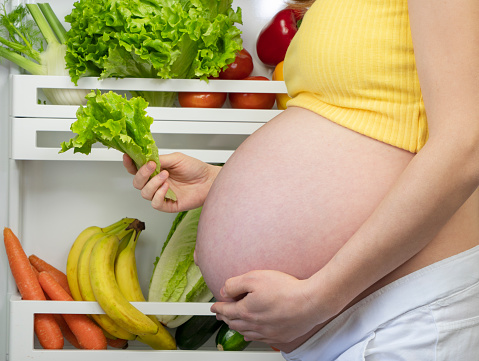Pregnancy can be an exciting time, but it also comes with a lot of changes and adjustments, including to your diet. To ensure a healthy pregnancy, it is important to be aware of what foods should be avoided during this special time. Here we will provide a list of the top 11 foods to avoid during pregnancy. From undercooked meats to certain types of seafood, there are certain foods that you should steer clear of in order to protect both you and your baby. Read on to find out about safe eating during pregnancy.
1) Alcohol

First and foremost, abstain from drinking. Pregnant women are advised not to consume any alcohol during pregnancy by both the Centers for Disease Control and Prevention (CDC) and the American College of Obstetricians and Gynecologists (ACOG). Alcohol use during pregnancy is not known to have a safe limit, and any amount of alcohol can raise the risk of miscarriage, stillbirth, and fetal alcohol syndrome (FAS). FAS is a severe medical disorder that is characterized by, among other flaws, learning challenges, growth problems, heart defects, hearing and vision problems, and renal issues. Speak with your healthcare practitioner as soon as you can if you learn you are pregnant and have already consumed alcohol. They can assist with risk assessment and prepare for the remainder of your pregnancy.
2) Caffeine

Caffeine is found in all popular beverages like tea, coffee, colas, and energy drinks. It is relatively safe among non-pregnant adults to drink these, though the amount should be limited to no more than 400 milligrams per day. While pregnant, it becomes extremely important to keep a tab on the amount of caffeine that you are consuming as high levels of caffeine intake during pregnancy can increase the risk of miscarriage, low birth weight, and premature birth. It may also negatively affect the baby’s growth and development and the health of the placenta.
The American College of Obstetricians and Gynecologists (ACOG) and the American Academy of Pediatrics (AAP) recommend that pregnant women limit their caffeine intake to less than 200 milligrams per day. This is roughly equivalent to one 12-ounce cup of coffee.
In addition to being mindful of how much caffeine you’re consuming, it’s also important to watch out for hidden sources of caffeine. Some energy drinks and many over-the-counter medications contain high levels of caffeine, so be sure to check the labels before you take them. If you’re pregnant and you find yourself feeling fatigued, try to get more sleep or opt for a healthy snack instead of reaching for a caffeinated beverage. Eating nutrient-rich snacks can give you the energy boost you need without having to worry about exceeding your daily caffeine limit.
3) Unpasteurized dairy

Dairy products that have not been pasteurized are known to contain bacteria that can harm unborn children and pregnant women. Dairy products that have not been pasteurized include yogurt, cheese, and milk. Before buying these products, it’s crucial to check the label and stay away from those that haven’t been pasteurized. To eradicate any potentially harmful bacteria, including listeria, from dairy products, pasteurization is utilized. A large number of other pollutants that could be hazardous to your health are also removed during the pasteurization process. Throughout your pregnancy, it’s important to stick with pasteurized dairy products to be safe.
4) Mercury-rich fish

It’s important to pay attention to the type of fish you eat when pregnant. Sharks, king mackerel, swordfish, and tilefish are among the mercury-rich fish that should be avoided while pregnant. These fishes have increased mercury content, which can be harmful to your health and the health of your unborn child. Pregnant women should stick to fish such as salmon, light canned tuna, pollock, and catfish which are found to have low mercury content. Pregnant women should also limit their consumption of certain types of fish to no more than 12 ounces per week and should not consume any additional mercury-rich fish.
5) Undercooked or raw meat and poultry

Meat and poultry that are undercooked or uncooked may contain bacteria and parasites that pose a major risk to the health of your unborn child. Eating these items can raise your chance of contracting foodborne diseases like E. coli infection, toxoplasmosis, and salmonella poisoning. As a result, it’s crucial to always fully prepare meat and poultry before consuming.
Only the freshest cuts of meat and poultry should be purchased; steer clear of any that have been left out at room temperature. Use a food thermometer to check the internal temperature of the meat before serving to make sure it has reached 165°F or higher. Remember to wash your hands thoroughly after touching any surfaces or utensils that have recently come into contact with raw meat or poultry.
6) Raw eggs

When it comes to pregnancy, raw eggs should be avoided. Although some dishes may include raw or lightly cooked eggs, such as aioli, mayonnaise, and mousse, it is best to avoid them entirely. This is because the risk of consuming bacteria such as salmonella, which can cause food poisoning, is too great for pregnant women.
To avoid the risk, use pasteurized eggs or egg products instead, as they have been heated to a temperature that kills bacteria. When cooking with eggs, make sure they are thoroughly cooked, with no traces of raw egg visible.
If you’re eating out, always ask your server if a dish contains raw eggs or ask them to substitute the raw eggs with pasteurized eggs. It is also important to be mindful when consuming foods like Caesar salad dressing and Hollandaise sauce, as they often contain raw egg yolks.
By avoiding raw eggs during pregnancy, you can reduce your risk of developing food poisoning and protect both your and your baby’s health.
7) Herbal teas

Instead of relying on herbal teas, it’s crucial to consume the right nutrients from a balanced diet when pregnant. During pregnancy, some herbs can be beneficial while others can be toxic. Before taking any herbal tea while pregnant, it is best to do some research or consult your healthcare professional.
8) Unwashed produce

Fruits and vegetables should always be washed before consumption, but this is crucial during pregnancy. Salmonella, listeria, and E. coli are just a few of the dangerous bacteria that can be found on unwashed produce. These can have a major negative impact on both the health of pregnant mothers and unborn children. So, before consuming any fruits or veggies, make sure you wash them well under running water. Make sure the produce has been washed before purchase if you buy it already sliced. Additionally, after coming into contact with any raw produce, make sure to sanitize any knives, cutting boards, and worktops.
9) Processed meats

One of the items to avoid during pregnancy is processed beef. Any kind of meat that has been treated, smoked, canned, cured, or chemically preserved is said to be processed meat. Hot dogs, pepperoni, salami, bacon, ham, and corned beef are a few examples of processed meats.
These meats can contain dangerous bacteria like listeria and salmonella, which can result in major difficulties for your unborn child. They are frequently heavy in salt and preservatives as well. It is therefore advised to avoid certain meats during pregnancy.
If you do decide to consume processed meats, make sure to cook them to the proper internal temperature and stay away from meats that have been left out for an extended period of time. You should also be careful of the components in processed meats; search for nitrate-free varieties and those low in fat, salt, and sugar.
10) Junk food

Processed and packaged foods that are abundant in calories, sugar, salt, and fat but poor in vital nutrients like protein, vitamins, and minerals are referred to as junk food. Junk food consumption during pregnancy can be harmful to both the mother and the unborn child. It may cause the mother to develop gestational diabetes, put on weight, or experience other health issues. It may increase the baby’s risk of obesity, diabetes, and other long-term health problems. For the health of both the mother and the unborn child, avoiding junk food throughout pregnancy is the best option. Choose nutritious alternatives instead, such as fruits, vegetables, whole grain crackers, almonds, and yogurt.
11) Certain fruits

All fruits are generally safe to eat during pregnancy, but certain fruits may contain some chemicals that can have an untoward effect on the pregnancy. Don’t be discouraged to eat fruits but be mindful of a few things like:
- Unripe papaya: Unripe papaya contains a latex substance that can cause contractions of the uterus, which can lead to premature labor. Therefore, it is best to avoid unripe papaya during pregnancy.
- Unripe pineapple: Pineapple contains bromelain, an enzyme that can cause contractions and soften the cervix, which can lead to premature labor. Therefore, it is best to avoid large amounts of pineapple during pregnancy.
- Persimmon: Persimmons contain a high amount of tannins which can cause uterine contractions, it is better to avoid consuming them during pregnancy.
- Grapes: Grapes contain resveratrol, a chemical that can cause contractions and lead to premature labor. Therefore, it is best to avoid large amounts of grapes during pregnancy.
- Mango: Mangoes contain a chemical called urushiol which can cause skin irritation and rashes.
- Strawberries: Strawberries contain high levels of histamine, which can lead to allergic reactions and stomach upset.
Conclusion
We can’t emphasize enough the importance of following a balanced and nutritious diet during this critical stage of development. Pregnant women should aim to consume a variety of foods from all food groups, including lean protein, whole grains, fruits and vegetables, and dairy. At the same time, they should avoid certain foods that may pose a risk to their health or the health of their developing fetus.
It’s also important to note that women who are pregnant should seek advice from their doctor or a registered dietitian to determine their specific nutrient needs and to ensure that their diet is safe and appropriate for their individual circumstances.
In conclusion, by following a healthy and balanced diet and avoiding certain foods, pregnant women can help to ensure the health and well-being of themselves and their developing fetuses.

Akanksha Sharma
Dr. Akanksha Sharma, Head Writer and creator of AtoZ of Pregnancy, is dedicated to empowering women, parents, and families through 360-degree knowledge. She and her team provide evidence-based advice to guide families through pregnancy, parenting and beyond.






